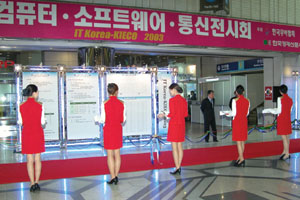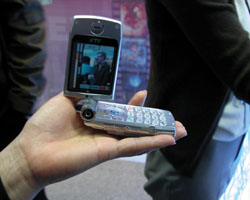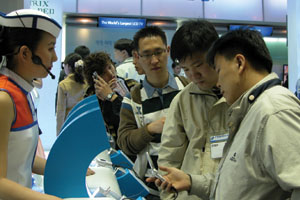Korea Bets on A Digital Future
Back to Contents of Issue: July 2003
|
|
|
|
by John Alderman |
|
 THEY COULD HARDLY HAVE picked a worse moment to hold an IT convention in Korea: The SARS scare was starting to spread, there was a growing threat of nuclear animosity between North and South and the IT industry, as well as the world economy, was in a trough of unpredictable duration. But in spite of these obstacles, or perhaps because they added urgency to the proceedings, IT-Korea KEICO 2003, South Korea's biggest IT exhibition, managed to pull off something impressive. Held in the COEX exhibition hall from April 10 to 13, the fair generated excitement and spread the word about South Korea's continuing technological successes and vividly outlined its plans to meet economic challenges through innovative digitalization. Amid an atmosphere of global uncertainty, one left COEX hall feeling encouraged: Some very good -- and very interesting -- days lie ahead. THEY COULD HARDLY HAVE picked a worse moment to hold an IT convention in Korea: The SARS scare was starting to spread, there was a growing threat of nuclear animosity between North and South and the IT industry, as well as the world economy, was in a trough of unpredictable duration. But in spite of these obstacles, or perhaps because they added urgency to the proceedings, IT-Korea KEICO 2003, South Korea's biggest IT exhibition, managed to pull off something impressive. Held in the COEX exhibition hall from April 10 to 13, the fair generated excitement and spread the word about South Korea's continuing technological successes and vividly outlined its plans to meet economic challenges through innovative digitalization. Amid an atmosphere of global uncertainty, one left COEX hall feeling encouraged: Some very good -- and very interesting -- days lie ahead.
Organized by the Korean International Trade Association and the Korea Economic Daily, the convention highlighted Korea's commitment to building a high-tech nation at all levels. It also showcased the nation's industriousness. Inventive startups and established consumer goods makers strutted their stuff, while the national push to develop ubiquitous broadband and wireless connections was in ample evidence. Sure, it wasn't overflowing with visitors, and one had to question the usefulness of some of the innovations. But in this post-IT bubble era, those were small things to complain about.
Some 220 foreign and local companies, large and small, gathered together to face approximately 500 buyers from 50 different countries. At the COEX hall, big Korean companies --Samsung, LG and others -- were in full bloom, with mountains of sexy consumer goods displayed by uniformed teams of sexy women. Television, video and audio systems were often given pride of place, a little strange for an IT convention, but pointing to a convergence of traditional and digital media, as many new consumer devices become Internet-enabled. Representing Japan, Fujitsu's staid booth definitely did not compete on showmanship or glitz, but displayed a solid array of computing parts aimed at manufacturers.
Korea will be an important testing ground
Kim says that when the operation is completed by 2005, all "trading companies will be able to carry out their business based on the Internet for 24 hours a day." He also expects that 50 percent of small and medium-sized businesses, as well as the 100 largest trading companies, will transform themselves into e-commerce firms. The result of this, he predicts, will be that "over 40 percent of the total sales will be transacted through e-commerce." Predicted savings from the plan would run as high as $14.5 billion, and 120,000 new jobs would be created. A pretty bold statement and bold plan that might be easy to wave off, except that there has already been such heavy government support and public acceptance. And it's not just OEM parts for electronics manufacturers or securities that will move online: The trade association plans to help old-fashioned agricultural and fish sales make the transition to an online trading system.
Of course, you may have more reason than ever not to lose that phone, because in upwardly mobile Korea it might also be your money supply. LG showcased an m-commerce mobile phone that lets owners use it like a credit card. While prototypes and plans have been announced in other countries and from other makers, the rate of adoption in Korea makes it a prime location for test marketing such products.
In a press conference Jun-Hyong Rho, the director general of the national information and Communication Policy Bureau, expressed hopes that IT would be the "new growth engine of the Korean economy," and said that he foresaw expansion, despite the worldwide slump. South Korea, as he sees it, will compensate for its late industrialization by being a front runner in digitalization. He outlined his belief that the government would play an important role in driving positive change. The most important roles that he expressed were in building the infrastructure and making sure that people are comfortable and prepared to work and communicate within that structure. The policies he announced made it clear that Korea will be an important testing ground to see how widespread, everyday use of broadband, wireless and other high technology affects economies and cultures.
Before it can lead the world, Korea's
This kind of widespread policy comes with its risks. In the past, South Korea focused on proven industries, where it was essentially catching up to foreign innovation. There was not much time and money for the testing of new ideas, and plenty of markets already existed for the tried and true designs of automobiles and televisions. Today, as the nation becomes a global leader, it faces territories through which no one else has beaten a path. The possibility of failure is now very real, especially given the uncertainty of the global economy. But with increasing regional competition, South Korea sees no other option than to forge ahead. @ |
|
Note: The function "email this page" is currently not supported for this page.


 Because of a domestic recession, sales in Korea dropped by 15 percent this year, further emphasizing the need for exports. Thankfully, these did well enough, rising 15.1 percent. As the manufacturing-heavy Korean economy tries to compete with the looming threat of Chinese industry, Korea's strategy has been to change from copycat and discount goods to making high-quality and high-cost products, while pushing increasingly strong brands. Not surprisingly, Samsung, LG and other major brands have been seen as often in TV adverts as they have been attached to TVs themselves. The flipside of China's rising competitiveness has been its growth as a target for export goods. Korean exports to China rose by 30.6 percent in 2002, up to $23.7 billion, mostly due to mobile phones, computers and semiconductors, as well as steel and petroleum products, according to Korean International Trade Association chairman Jae-Chul Kim. This local investment in broadband is paying off internationally: Korean manufacturing for broadband infrastructure is fast becoming one of its worldwide export strengths.
Because of a domestic recession, sales in Korea dropped by 15 percent this year, further emphasizing the need for exports. Thankfully, these did well enough, rising 15.1 percent. As the manufacturing-heavy Korean economy tries to compete with the looming threat of Chinese industry, Korea's strategy has been to change from copycat and discount goods to making high-quality and high-cost products, while pushing increasingly strong brands. Not surprisingly, Samsung, LG and other major brands have been seen as often in TV adverts as they have been attached to TVs themselves. The flipside of China's rising competitiveness has been its growth as a target for export goods. Korean exports to China rose by 30.6 percent in 2002, up to $23.7 billion, mostly due to mobile phones, computers and semiconductors, as well as steel and petroleum products, according to Korean International Trade Association chairman Jae-Chul Kim. This local investment in broadband is paying off internationally: Korean manufacturing for broadband infrastructure is fast becoming one of its worldwide export strengths.
 Consumer goods dominated the exhibits staged by the larger brands: television sets, mobile phones, cameras and audio systems, both portable and stationary. (For audio and video systems, a mirrored front panel is the look of the moment.) Meanwhile the more standard IT section ran the gamut of enterprise software by German powerhouse SAP to business process software by Korean company Handysoft, which took the opportunity to display its new groupware, knowledge management and e-learning products. Closer to home, an impressive number of startups and inventors were promoting home security systems driven by a mobile or Web interface. A typical example was the Veilguard by Dawoo Info-Com. Just dial a number on your phone and it will lock or unlock your door. Simple and effective, but it raises the question: When you come home drunk, are you less likely to forget your phone and its code than your keys?
Consumer goods dominated the exhibits staged by the larger brands: television sets, mobile phones, cameras and audio systems, both portable and stationary. (For audio and video systems, a mirrored front panel is the look of the moment.) Meanwhile the more standard IT section ran the gamut of enterprise software by German powerhouse SAP to business process software by Korean company Handysoft, which took the opportunity to display its new groupware, knowledge management and e-learning products. Closer to home, an impressive number of startups and inventors were promoting home security systems driven by a mobile or Web interface. A typical example was the Veilguard by Dawoo Info-Com. Just dial a number on your phone and it will lock or unlock your door. Simple and effective, but it raises the question: When you come home drunk, are you less likely to forget your phone and its code than your keys?
 Rho announced "a national strategy to lead the world in the 21st century." But before it can lead the world, Korea's main hurdle is to help Koreans at home. Computer education would be extended to the public, with special assistance given to "marginalized people," including "housewives, the disabled, soldiers and prisoners." Attempting to alleviate any digital divide, the government has implemented policies that lower broadband fees, provide inexpensive PCs and fund broadband networks for communities of over 100 people, Rho said. There is also a big push for people-friendly digital e-government, with public affairs easily accessible, online passport processing and other marks heralding a coming "age of electronic democracy."
Rho announced "a national strategy to lead the world in the 21st century." But before it can lead the world, Korea's main hurdle is to help Koreans at home. Computer education would be extended to the public, with special assistance given to "marginalized people," including "housewives, the disabled, soldiers and prisoners." Attempting to alleviate any digital divide, the government has implemented policies that lower broadband fees, provide inexpensive PCs and fund broadband networks for communities of over 100 people, Rho said. There is also a big push for people-friendly digital e-government, with public affairs easily accessible, online passport processing and other marks heralding a coming "age of electronic democracy."



